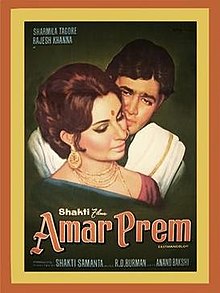| Amar Prem | |
|---|---|
 | |
| Directed by | Shakti Samanta |
| Screenplay by | Arabinda Mukherjee Ramesh Pant (dialogue) |
| Based on | Hinger Kochuri by Bibhutibhushan Bandopadhyay and Nishi Padma (Bengali Film) |
| Produced by | Shakti Samanta |
| Starring | |
| Cinematography | Aloke Dasgupta |
| Edited by | Govind Dalwadi |
| Music by | R. D. Burman |
Production company | Shakti Films |
Release date |
|
| Country | India |
| Language | Hindi |
Amar Prem (transl. Immortal Love) is a 1972 Indian Hindi romantic drama film directed by Shakti Samanta. It is a remake of the Bengali film Nishi Padma (1970),[1] directed by Arabinda Mukherjee, who wrote screenplay for both the films based on the Bengali short story Hinger Kochuri by Bibhutibhushan Bandopadhyay. The film portrays the decline of human values and relationships and contrasts it by presenting an illustrious example of a boy's innocent love for a neighbourhood tawaif (courtesan).[2] The movie is about a school boy, who is ill-treated by his step mother, and becomes friends with a courtesan neighbour.[3] The film stars Sharmila Tagore playing a hooker with a heart of gold, with Rajesh Khanna in the role of a lonely businessman and Vinod Mehra as adult Nandu, the young child, who they both come to care for.[4][5]
The film is noted for its music by R. D. Burman; numbers sung by playback singers like Kishore Kumar, R.D. Burman's father S.D. Burman and Lata Mangeshkar; lyrics were by Anand Bakshi. The songs and soundtrack written by Anand Bakshi and sung by Kishore Kumar were well-received, with Chingaari Koi Bhadke topping at 5th position on the year-end chart Binaca Geetmala annual list 1972.
- ^ "Remakes of Bengali films: What's new in this trend? - Times of India". The Times of India.
- ^ "AMAR PREM : Juxtaposing legend and contemporary subtext". Archived from the original on 7 February 2009. Retrieved 27 February 2009.
- ^ Cite error: The named reference
exp12was invoked but never defined (see the help page). - ^ "Sharmila Tagore: Shattering Stereotypes for Over 60 Years".
- ^ "Amar Prem (1972)".